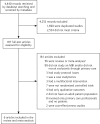The Efficacy of Mindfulness-Based Interventions in Primary Care: A Meta-Analytic Review
- PMID: 26553897
- PMCID: PMC4639383
- DOI: 10.1370/afm.1863
The Efficacy of Mindfulness-Based Interventions in Primary Care: A Meta-Analytic Review
Abstract
Purpose: Positive effects have been reported after mindfulness-based interventions (MBIs) in diverse clinical and nonclinical populations. Primary care is a key health care setting for addressing common chronic conditions, and an effective MBI designed for this setting could benefit countless people worldwide. Meta-analyses of MBIs have become popular, but little is known about their efficacy in primary care. Our aim was to investigate the application and efficacy of MBIs that address primary care patients.
Methods: We performed a meta-analytic review of randomized controlled trials addressing the effect of MBIs in adult patients recruited from primary care settings. The PRISMA (Preferred Reporting Items for Systematic Reviews and Meta-Analyses) and Cochrane guidelines were followed. Effect sizes were calculated with the Hedges g in random effects models.
Results: The meta-analyses were based on 6 trials having a total of 553 patients. The overall effect size of MBI compared with a control condition for improving general health was moderate (g = 0.48; P = .002), with moderate heterogeneity (I(2) = 59; P <.05). We found no indication of publication bias in the overall estimates. MBIs were efficacious for improving mental health (g = 0.56; P = .007), with a high heterogeneity (I(2) = 78; P <.01), and for improving quality of life (g = 0.29; P = .002), with a low heterogeneity (I(2) = 0; P >.05).
Conclusions: Although the number of randomized controlled trials applying MBIs in primary care is still limited, our results suggest that these interventions are promising for the mental health and quality of life of primary care patients. We discuss innovative approaches for implementing MBIs, such as complex intervention and stepped care.
Keywords: complex interventions; meta-analysis; mindfulness-based interventions; practice-base research; primary care; randomized controlled trials.
© 2015 Annals of Family Medicine, Inc.
Figures


Similar articles
-
Effectiveness of online mindfulness-based interventions in improving mental health: A review and meta-analysis of randomised controlled trials.Clin Psychol Rev. 2016 Apr;45:102-14. doi: 10.1016/j.cpr.2016.03.009. Epub 2016 Apr 1. Clin Psychol Rev. 2016. PMID: 27111302 Review.
-
The empirical support for mindfulness-based interventions for common psychiatric disorders: a systematic review and meta-analysis.Psychol Med. 2018 Oct;48(13):2116-2129. doi: 10.1017/S0033291718000259. Epub 2018 Feb 19. Psychol Med. 2018. PMID: 29455695
-
The effect of mindfulness-based interventions on caregiver burden, quality of life and psychological distress in caregivers of adults with chronic diseases: Systematic review and meta-analysis of randomized controlled trials.Worldviews Evid Based Nurs. 2024 Oct;21(5):528-541. doi: 10.1111/wvn.12736. Epub 2024 Jun 13. Worldviews Evid Based Nurs. 2024. PMID: 38867643
-
Mindfulness-based interventions for psychological and physical health outcomes in cancer patients and survivors: A systematic review and meta-analysis of randomized controlled trials.Psychooncology. 2019 Dec;28(12):2257-2269. doi: 10.1002/pon.5214. Epub 2019 Sep 11. Psychooncology. 2019. PMID: 31464026 Free PMC article.
-
Research Review: The effects of mindfulness-based interventions on cognition and mental health in children and adolescents - a meta-analysis of randomized controlled trials.J Child Psychol Psychiatry. 2019 Mar;60(3):244-258. doi: 10.1111/jcpp.12980. Epub 2018 Oct 22. J Child Psychol Psychiatry. 2019. PMID: 30345511 Free PMC article. Review.
Cited by
-
Mindfulness in primary care healthcare and teaching professionals and its relationship with stress at work: a multicentric cross-sectional study.BMC Fam Pract. 2021 Feb 2;22(1):29. doi: 10.1186/s12875-021-01375-2. BMC Fam Pract. 2021. PMID: 33530929 Free PMC article. Clinical Trial.
-
The Impact of App-Delivered Mindfulness Meditation on Functional Connectivity and Self-Reported Mindfulness Among Health Profession Trainees.Mindfulness (N Y). 2021;12(1):92-106. doi: 10.1007/s12671-020-01502-7. Epub 2020 Oct 7. Mindfulness (N Y). 2021. PMID: 33052251 Free PMC article.
-
Maternal Mindfulness Is Associated With Lower Child Body Mass Index Z Score.Acad Pediatr. 2021 Jan-Feb;21(1):70-75. doi: 10.1016/j.acap.2020.06.012. Epub 2020 Jun 23. Acad Pediatr. 2021. PMID: 32590057 Free PMC article. Clinical Trial.
-
The effects of mindfulness-based interventions on anxiety, depression, stress, and mindfulness in menopausal women: A systematic review and meta-analysis.Front Public Health. 2023 Jan 9;10:1045642. doi: 10.3389/fpubh.2022.1045642. eCollection 2022. Front Public Health. 2023. PMID: 36699873 Free PMC article.
-
Impact of App-Delivered Mindfulness Meditation on Functional Connectivity, Mental Health, and Sleep Disturbances Among Physician Assistant Students: Randomized, Wait-list Controlled Pilot Study.JMIR Form Res. 2021 Oct 19;5(10):e24208. doi: 10.2196/24208. JMIR Form Res. 2021. PMID: 34665153 Free PMC article.
References
-
- Cullen M. Mindfulness-based interventions: an emerging phenomenon. Mindfulness. 2011;2(3):186–193.
-
- Khoury B, Lecomte T, Fortin G, et al. Mindfulness-based therapy: a comprehensive meta-analysis. Clin Psychol Rev. 2013;33(6):763–771. - PubMed
-
- Kuyken W, Byford S, Taylor RS, et al. Mindfulness-based cognitive therapy to prevent relapse in recurrent depression. J Consult Clin Psychol. 2008;76(6):966–978. - PubMed
-
- van Ravesteijn H, Grutters J, olde Hartman T, et al. Mindfulness-based cognitive therapy for patients with medically unexplained symptoms: a cost-effectiveness study. J Psychosom Res. 2013;74(3): 197–205. - PubMed
Publication types
MeSH terms
LinkOut - more resources
Full Text Sources
Other Literature Sources
Medical
